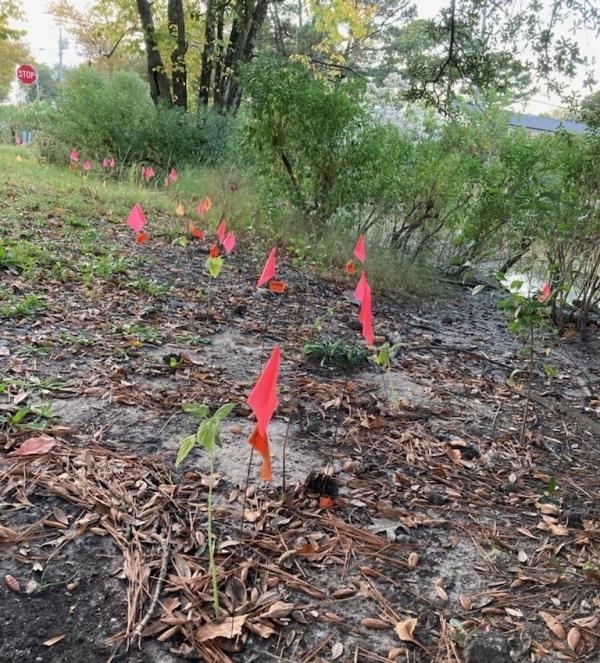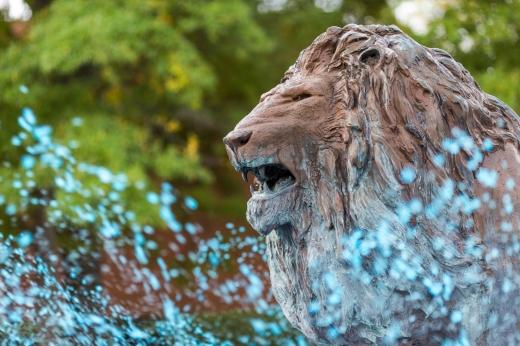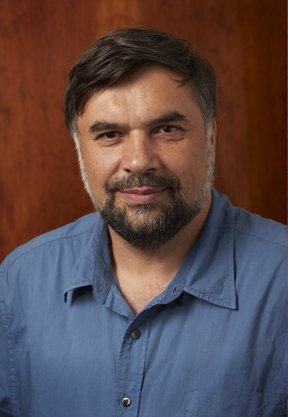Flags mark where the biology students are monitoring the marsh.
By Phil Walzer
A lab in Lisa Horth's Conservation Biology this semester offered a lesson in cross-pollination of a different sort: The campus and community joined forces to help preserve the local wetlands.
Horth's students planted and monitored native marsh plants at the 46th Street wetland restoration site tended by the Lafayette Wetlands Partnership. "This assignment was a nice learning experience for me," said Bryce Deaver, a student in the class. "It's a good lesson on how fixing the environment starts small, but every little bit counts."
The Lafayette Wetlands Partnership is a private organization that mentors groups and individuals who want to restore wetland habitats along the Lafayette River in Norfolk. John Stewart, who has worked with the partnership since its founding in 2008, said the project benefited both the community and University.
"Citizens bring a lot of energy and willingness to do the work, but we require alignment with scientists and environmental engineers," he said. "Scientists have a lot to learn about how the community sees science, but citizens have a lot to learn about what science is."
This is the third group of Horth's students who have worked with the partnership. Previously, they completed plantings that attracted pollinators to the site.
The partnership has received assistance from other ODU faculty members and organizations, including Taylor Sloey and Erik Yando, assistant professors of biological sciences, Fred Dobbs, professor and chair of ocean and earth sciences, and the Marine Biology Student Association.
For Horth's class this year, the partnership purchased about 20 plants from four species at Lady Fern's Native Plants with funding from the City of Norfolk. The students aimed to plant each where it had the best chance to thrive, differentiating in terms of such factors as sun or shade and distance from the water. Along the way, they learned about tides and other aspects of the habitat.
Horth, a professor of biological sciences, gave them an added challenge: She provided students clues about the plants, such as shape and the pattern of veins, but not their names. They then attempted to deduce their identities.
They also provided statements about what they had learned. "The rapid loss of wetland habitat is precisely why this project was not just fun but important," Megan Lane wrote. "It is important to understand the current condition of our planet but even more important to know how to help it."
Marisa Joachim said, "Honestly, before this course, I did not even know there was a conservation site near ODU, let alone only a few blocks from where I park every day. This site also provides a literal hands-on opportunity for students to give back to the environment while still in school."
For Sophie Solomon, "this assignment was very beneficial. It gave students the unique opportunity to interact and get familiar with native plant life."
Horth, who intends to repeat the project with the Lafayette Wetlands Partnership next fall, said, "It was not a conventional lab, but hopefully they walked away changed and informed. I want them to be tied to the land in a way they may not have felt before. I tried to instill in them that a small effort, conducted by many and over time, can effect real change."
For more information about the Lafayette Wetlands Partnership, contact Ruth Martin.
Related News Stories
Alexander Gurevich, Michelle Kelley Earn Faculty, Research, Scholarship and Creative Achievement Awards
The honor is presented annually by ODU’s Office of Research. (More)
Andrei Pakhomov Named Interim Executive Director of the Reidy Research Center for Bioelectrics
The research professor, who has been at ODU since 2005, has earned 17 extramural grants totaling more than $15 million. (More)
ODU Establishes oneAPI Center of Excellence to Optimize NASA Research
The initiative will be led by Mohammad Zubair, a professor of computer science, to help solve some of the most complex aerodynamic challenges. (More)






